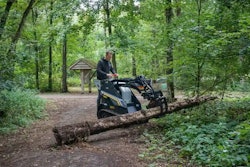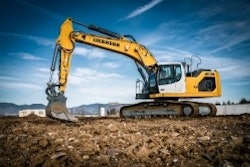It didn’t take Eric Gustafson long to figure out he didn’t want to spend a career sitting behind a desk making telemarketing phone calls. But as a 21-year-old college graduate with a new bride to support, Gustafson knew he couldn’t afford to gamble when it came to earning a living. “I didn’t have a trade then,” he recalls. “and I knew nothing about the trades. But I knew that I wanted to work outside, and electricians made good money.”
So Gustafson went to work for a friend of the family who owned an electrical contracting company specializing in residential construction. His timing was good. His hometown of Loveland, Colorado, is situated north of Denver, and the Mile High City’s urban sprawl was beginning to turn Gustafson’s sleepy little prairie village into a bedroom community.
Gustafson may not have known much about electrical wiring, but he’d inherited a good set of work ethics and some basic ability to work with his hands thanks to his father, who owned and operated a machine shop in Loveland. Gustafson quickly picked up the electrician trade and discovered he was good at it. But then he discovered he had a knack for operating construction equipment. “We had a beat-up old trencher we used to install electric mains with,” Gustafson recalls. “Over time, the owner started having me run it. I got stuff done. My work ethic was my father’s – very blue collar. Hard work is expected and rewarded. But it also meant I got stuck doing all the digging.”
Gustafson’s skills grew to the point he took a job working for a small construction company in Loveland. “This guy had more equipment,” Gustafson recalls. “We had an old backhoe and some larger machines. It was all beat to hell, but I was running my own crew now and really enjoyed the work.”
Part of the deal was Gustafson would gradually take more managerial responsibilities from his boss, who was contemplating retirement. “I was learning about managing people, dealing with customers and handling the paperwork,” he says. “And as I realized I enjoyed all the aspects of it, I figured out I really didn’t want to work for someone else. I wanted my own construction business.”
A client list of five … Four of whom are retiring
Gustafson’s boss liked the idea of selling out to his young manager, but was in no hurry to retire. He wanted to wait a couple of years and “see how things went.” But Gustafson wasn’t in the mood to wait around for his chance and the timing was working in his favor. His father had just sold his farm and was looking for another business to invest in. So Eric went and talked his situation over with his father.
After hearing his son’s pitch, Gustafson’s father suggested making the company owner an offer. “We talked for a week or so, but he kept putting me off,” Gustafson says. “Finally I decided I couldn’t wait any longer. I told him, ‘I need to either quit or you can sell me the construction portion of your business.'”
Gustafson’s persistence paid off. It was 1995, and Gustafson and his father were the proud owners of an old, beat up Ford 555 backhoe and trencher and a trailer to pull them around on. “I had to get a truck,” Gustafson says. “So I got an old farm pickup from my dad.”
In addition, the new construction company owners inherited the previous owner’s client list, which numbered five – four of whom were either retired or about to retire. “And on top of that, my father didn’t know a damn thing about digging ditches,” Gustafson says with a laugh. It was an inauspicious start, to say the least.
Still, Eric and his father felt they had an ace up their sleeves: their work ethic and desire to succeed. “My dad is great. He’d never failed at anything he set his mind to,” Gustafson says. “So we sat down and figured out how we were going to do it.”
The plan Eric and his father devised was relatively simple and a credit to the older Gustafson’s faith and dedication to his son. The Gustafsons would be partners. But Eric’s father would pass on taking a paycheck in order to help his son get on his feet. Together they’d hire some good employees, line up a solid customer base and then, in a couple years, Eric’s father would step away and enjoy his retirement. “Hell, he worked for me for five years,” Gustafson says with a laugh. “But I’m glad he did. Because I knew how to do the construction end of things – running equipment, installing lines, managing a crew and all of that. But I didn’t know how to run a business from the office end of things and make it successful.”
Not in business to get rich on one job
Gustafson and his father set to work, each teaching the other important skills they’d need to know to make their business a success. “He taught me a lot more than I taught him,” Gustafson says. “He’d always been good with his hands, so picking up the construction end of the business wasn’t a problem for him. And – no surprise – he loved it as much as I did.”
In return, his father taught Gustafson how to crunch numbers and find out the break-even point on jobs. According to Gustafson, his dad’s overall message was straightforward: You need and deserve to make a buck. But you don’t need to get rich overnight. We’re not in this business to do just one job. We’re in it to do many jobs for many years. “It was – and is – great advice,” Gustafson says. “I still follow those principles to this day.”
The other lesson he quickly absorbed was to do what he said he was going to do on a job. “I had to,” Gustafson says. “I had no choice. I was a seriously young kid, but I was doing all the bidding and going up for city contracts against much bigger companies out of Denver. We had clients who were willing to take a chance on us because our overhead was low and we could work cheap. But in order to get repeat business, we had to work really hard and deliver exactly what we promised.”
The work ethic Eric and his father showed on the city utility projects paid off. Developers moving into the Loveland area were looking for local utility contractors. “We were going in and doing things right the first time,” Gustafson says. During one particularly busy stretch, Eric and his father worked five months straight without taking a day off. The pace was brutal. And it was especially tough on their families. But the buzz was growing about the upstart construction company. They were starting to get more work.
“The first thing we upgraded was our trencher,” Gustafson says. “Because at the time, that’s all we did all day long – trenching work.”
When it came to financing a new machine, his father’s wisdom overcame Gustafson’s fears. “My father told me I wasn’t making money if I was working on my equipment all day long,” he notes. “It’s better to buy it new, allow it to depreciate and take the tax break on it. Once it’s paid for, keep it, and rotate it through the fleet. So long as it’s making money for you, it’s a no-lose proposition.” Armed with that advice, Gustafson added his first piece of new equipment to his fleet – a Premier 5500 trencher.
Good pay and a positive place to work
Today, G & E Construction has an equipment fleet of three backhoe loaders, a compact excavator, two trenchers, four skid-steer loaders and a host of Ford SuperDuty pickup trucks. His father has finally retired. Eric bought out his half of the business about five years ago, although his father is still known to turn up on jobsites if he happens to be in town. In his place, Gustafson has 12 full-time employees, but still limits his work to the booming Loveland area.
The compact excavator is G&E’s latest equipment acquisition – and a new machine type for Gustafson, who is accustomed to digging with backhoes. “In addition to a host of commercial and residential work, we still do about 90 percent of Loveland’s municipal utility contracts,” he says. “We were starting to get in jobs where we needed to take powerlines down, or in older neighborhoods where there’s not much room to work. So the compact excavator has been a good addition to the fleet.”
G&E Construction still puts in a hard seven-day work week, but Gustafson admits that’s more a function of his own upbringing than a need to prove anything to anyone. “We’re established and doing well,” he says. “But I still believe in giving my customers the best and fastest service possible.”
Despite the long work weeks, Gustafson says he knows he couldn’t make his company a success without his employees. “We do work hard,” he says. “But I believe in paying my guys well for the jobs they do. Some of my competitors think I’m crazy. Their attitude is, ‘If a guy doesn’t like the job, let him go somewhere else.’ But I think if you pay well, you attract the best people and that shows in our work.”
Another thing Gustafson is insistent on is providing a positive work environment for his workers. “I can be tough to work for,” he admits. “I push myself hard and I have my father’s insane work ethic. And I’m detail-oriented. So I still want to jump down into trenches and supervise even the smallest part of an installation job. But I’m fair. And there’s no screaming or yelling or anything like that around here. I’ve worked for quite a few screamers in my time – bosses who just wanted to intimidate everyone around them. And I’m not like that. I insist on treating people the way I wanted to be treated when I was just another guy on a work crew.”
But Gustafson’s growing business is cutting into his time in the trenches – which bothers him. “So, the funny thing is I’ve come back full circle, where I’m stuck in my office all day,” he says. “We’re looking at expanding operations outside of Loveland. So I’m having to learn to trust my foremen more … I’m going crazy in the office, but I’m trying not to compensate for it by calling them every 10 minutes wanting to know what’s going on in the field.”







